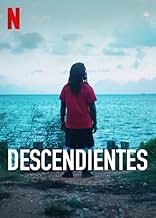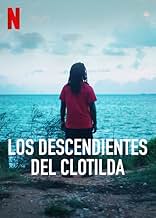IMDb रेटिंग
7.1/10
1.5 हज़ार
आपकी रेटिंग
क्लॉटिल्डा से बचे लोगों के वंशजों का अनुसरण करता है, आखिरी जहाज जो गुलाम अफ्रीकियों को संयुक्त राज्य में ले गया, जहां वे अपनी कहानी को पुनः प्राप्त करते हैं.क्लॉटिल्डा से बचे लोगों के वंशजों का अनुसरण करता है, आखिरी जहाज जो गुलाम अफ्रीकियों को संयुक्त राज्य में ले गया, जहां वे अपनी कहानी को पुनः प्राप्त करते हैं.क्लॉटिल्डा से बचे लोगों के वंशजों का अनुसरण करता है, आखिरी जहाज जो गुलाम अफ्रीकियों को संयुक्त राज्य में ले गया, जहां वे अपनी कहानी को पुनः प्राप्त करते हैं.
- पुरस्कार
- 7 जीत और कुल 24 नामांकन
फ़ीचर्ड समीक्षाएं
Hollywood fan of history and true events movies. This is for you dear. It elaborates the most tragic event in the history of United States of America, despite of being war with the Latin Americans (Red Indians) there is also a painful history of black Africans who were brought from Africa forcefully into the strange lands of America and become the slaves of white people. Most of them were also killed and separated from their families and even the children of africans faced these traumatic events at that time. After that a long struggle was started which gives them a little bit freedom but there are still lives who are waiting for justice.
If a person knew very little about slavery and the slave trade, this documentary would be a great shock and revelation. Since my earliest student days, however, the slave trade between Africa and the "Americas" stood high profile with me. It still does.
By focusing on the voyage of the "Clotilda", it being the last or one of the last slavers, and the descendance of its human cargo, it manages to cover the utterly dismal topic sufficiently. Grinning white people in suits referring to the reconstructive drawing of the "Clotilda" as "Wonderful" have no place in this story. This story belongs to African Americans, and how they were so late in history, abducted to the Americas by greedy white men.
These same men, and they were men, who now hold all the money and land from this outrage now are riding a gravy train of financial advantage. Overall, the abomination against humanity that was the entirety of the Africa-Americas slave business will remain a bleeding sore on our society until reparations are made. Now that would be a wonderful picture.
(Irving Warner)
By focusing on the voyage of the "Clotilda", it being the last or one of the last slavers, and the descendance of its human cargo, it manages to cover the utterly dismal topic sufficiently. Grinning white people in suits referring to the reconstructive drawing of the "Clotilda" as "Wonderful" have no place in this story. This story belongs to African Americans, and how they were so late in history, abducted to the Americas by greedy white men.
These same men, and they were men, who now hold all the money and land from this outrage now are riding a gravy train of financial advantage. Overall, the abomination against humanity that was the entirety of the Africa-Americas slave business will remain a bleeding sore on our society until reparations are made. Now that would be a wonderful picture.
(Irving Warner)
Contrary to widely held belief, just because the US slave trade was outlawed in 1808, that didn't end attempts to continue to import African slaves thereafter. It wasn't until 1860, when the last slave ship, the Clotilde, entered American waters with a hold full of slaves that the practice finally came to an end. And, to conceal this crime, which was punishable by death, the perpetrators scuttled the ship by burning it upon arrival. The location of the wreckage long remained a mystery until a diving team found it in shallow water just north of Mobile, AL in 2018-19. But the discovery was more than just an archaeological curiosity; it was also significant to the descendants of the Clotilde slaves, many of whom settled in a nearby community called Africatown when they achieved freedom after the Civil War in 1865. Those living today now have actual proof of their African lineage, as well as evidence of the crime that was committed against their ancestors. Director Margaret Brown's fourth feature outing explores this story from multiple angles in terms of its historic and personal importance, as well as from all of the fallout that stemmed from their ancestors' experience that has carried through to this day. Given the myriad threads presented in this documentary, the focus admittedly could have been a little tighter in spots, particularly in terms of how the narrative's many dots connect. But, that aside, the film effectively chronicles a little-known story that represents a significant benchmark in African-American history and a potential turning point in terms of how the American public at large views the question of this appalling institution and its after-effects, some of which have lingered but have gone virtually unaddressed and, arguably, even unrecognized all these years. This is a fine film that should be part of every grade school history class and a welcome addition to African-American History Month viewing.
I found this to be a fascinating documentary, that held my attention throughout.
That said, it left me with some unanswered questions, in part because of its format, which focused on interviews with people who lived in Africatown, near where the Clotilda, evidently the last slave ship to arrive in the United States, landed.
I can completely understand why the director and producer would want to give these people a chance to express their views and feelings. They had been ignored for so long.
And I know that documentaries can only be so long before viewers start to turn out and off.
But I would have liked more background about a variety of issues. Do we know anything about the Clotilda's route to the States? Do we know where in Africa it left from? Have any of the descendants taken DNA tests that would help with this?
What was life like for the descendants of the original slaves between the time of Emancipation and today?
And on and on.
None of that is a criticism of the movie, which I enjoyed very much. But because the story it told is so interesting, it left me wanting to know so much more.
That said, it left me with some unanswered questions, in part because of its format, which focused on interviews with people who lived in Africatown, near where the Clotilda, evidently the last slave ship to arrive in the United States, landed.
I can completely understand why the director and producer would want to give these people a chance to express their views and feelings. They had been ignored for so long.
And I know that documentaries can only be so long before viewers start to turn out and off.
But I would have liked more background about a variety of issues. Do we know anything about the Clotilda's route to the States? Do we know where in Africa it left from? Have any of the descendants taken DNA tests that would help with this?
What was life like for the descendants of the original slaves between the time of Emancipation and today?
And on and on.
None of that is a criticism of the movie, which I enjoyed very much. But because the story it told is so interesting, it left me wanting to know so much more.
The polluting factories and the highway that destroyed the Downtown area of Africatown are just other facts that help validate what the descendants are saying. Historians use oral histories as part of their research - this is a common practice. A lot of people don't want you to see this documentary. They are afraid of how it will make them look. They are afraid that it will explain someone's situation. This is one of the reasons I watched the documentary. It explains so much about the Bible Belt south. If you care about American history at all, you will find this documentary rewarding. Watch it and decide for yourself.
टॉप पसंद
रेटिंग देने के लिए साइन-इन करें और वैयक्तिकृत सुझावों के लिए वॉचलिस्ट करें
- How long is Descendant?Alexa द्वारा संचालित
विवरण
- रिलीज़ की तारीख़
- कंट्री ऑफ़ ओरिजिन
- आधिकारिक साइट
- भाषा
- इस रूप में भी जाना जाता है
- السلالة
- फ़िल्माने की जगहें
- उत्पादन कंपनियां
- IMDbPro पर और कंपनी क्रेडिट देखें
- चलने की अवधि
- 1 घं 49 मि(109 min)
- रंग
- ध्वनि मिश्रण
इस पेज में योगदान दें
किसी बदलाव का सुझाव दें या अनुपलब्ध कॉन्टेंट जोड़ें























